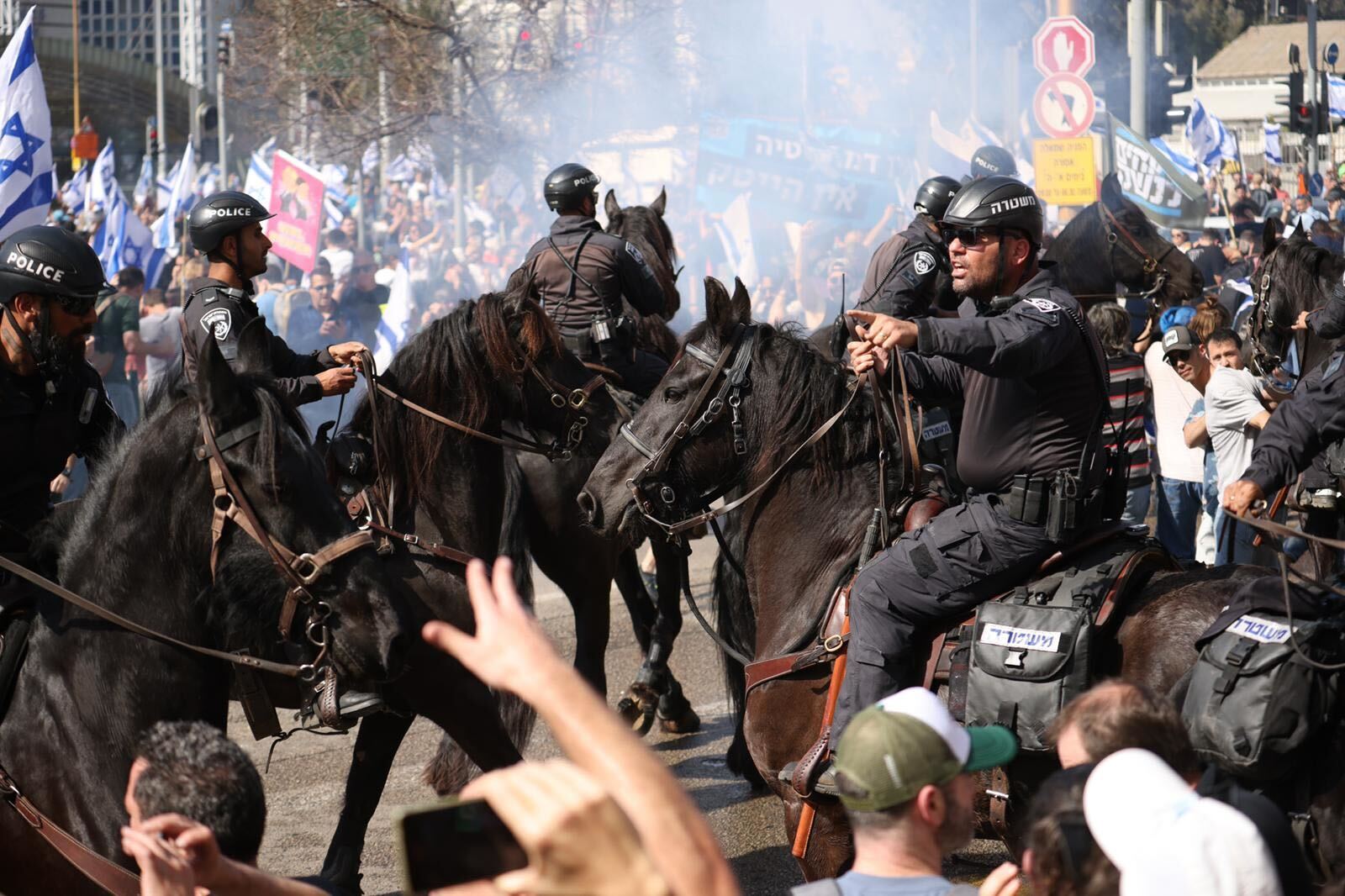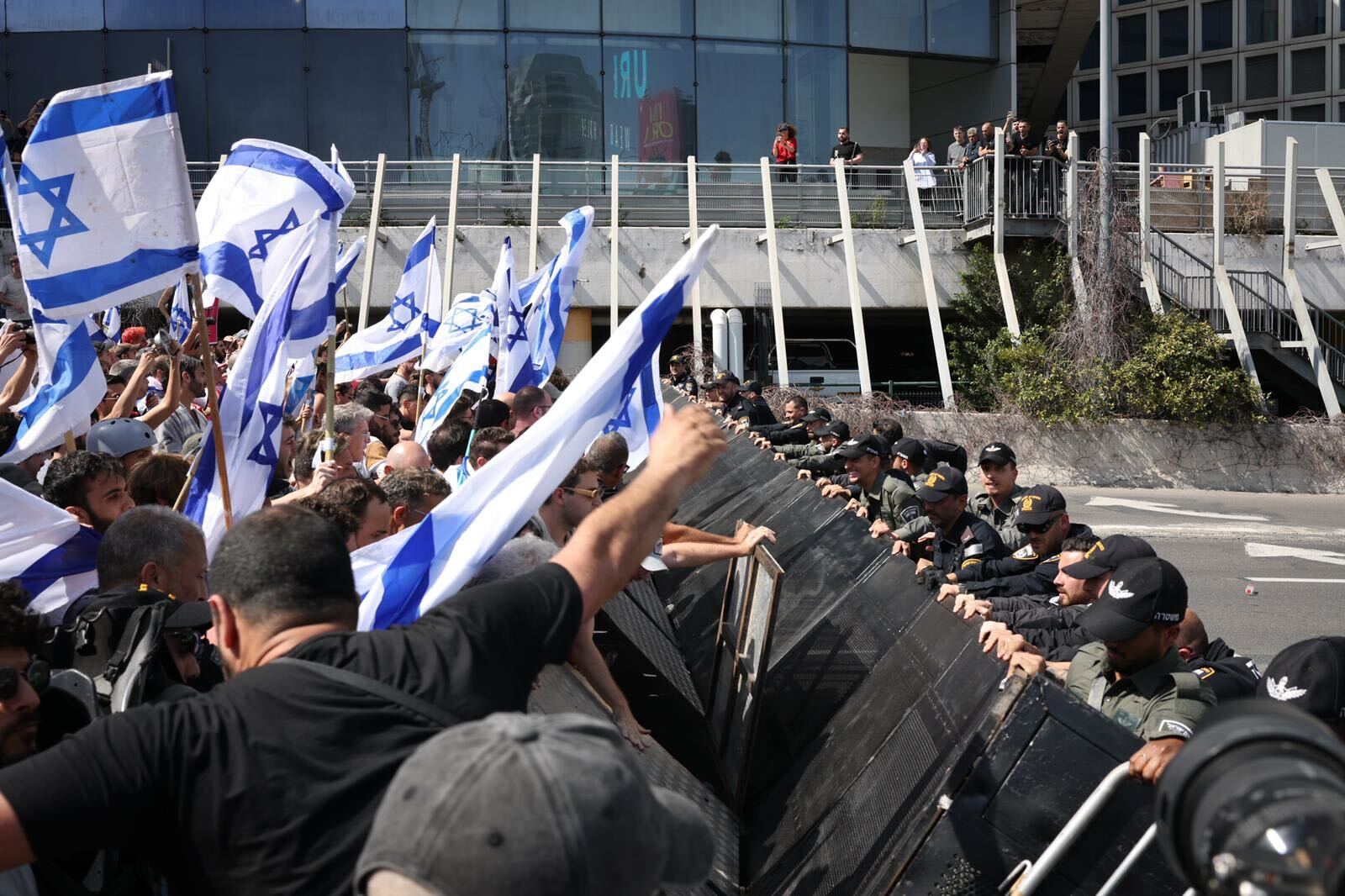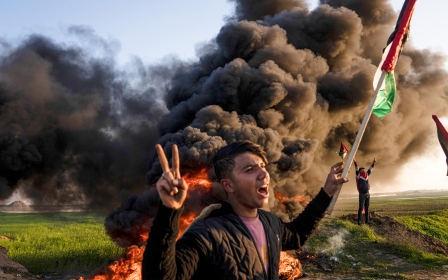Israel: Police assault protesters during anti-government marches
Israeli police violently dispersed protesters on Wednesday as thousands marched in different cities to protest against a controversial government plan to overhaul the judicial system, amid growing political turmoil.
At least 11 people were wounded from bruises, cuts and burns, according to a Tel Aviv hospital. Another 28 were arrested.
Protesters declared Wednesday a "national day of disruption", blocking vital roads and burning tyres on highways. Marches were set to culminate in a large demonstration in Tel Aviv and in front of the residence of Prime Minister Benjamin Netanyahu in Jerusalem.
Police have used stun grenades, water cannons and mounted officers to disperse demonstrators.
"These are fateful days for the country, that's why we are here," Omer Shemer, a protester, told Middle East Eye from the site of the demonstration in Tel Aviv.
New MEE newsletter: Jerusalem Dispatch
Sign up to get the latest insights and analysis on Israel-Palestine, alongside Turkey Unpacked and other MEE newsletters
"The reaction of the police today is related to the instructions of Ben-Gvir. We are shouting 'Where were you in Huwwara?' because they did a pogrom there and there are zero arrestees," Shemer said.
As protesters sought to block major transport intersections around Israel, the government instructed police officers to show zero tolerance.
Far-right National Security Minister Itamar Ben-Gvir branded the protesters anarchists and told police to break up the gatherings.
"We will not allow a civil uprising and anarchists to block major roads," Ben-Gvir said.
Israel is in the midst of a political crisis that has pitted Netanyahu’s far-right government against the country’s civil society, academic and business elite, and former government ministers and military figures.
Crowds are protesting against a government plan that would give parliament the power to override the Supreme Court through a simple majority vote, and de facto control over court nominees.
It would also limit the court’s ability to bar legislation that infringes human and civil rights.
Israel has no constitution, and there is little separation between the executive and legislative branches, as governments nearly always hold a majority in the parliament, the Knesset.
This has historically meant the Supreme Court is the most effective check on government power.
'The only chance'
Observers said the use of violent dispersal methods by the police against secular Jewish Israeli protesters is almost unheard of.
"I think it is remarkable to see demonstrators' bold actions today in blocking vital roads and public facilities, and in return the police violence. This suggests more violence will likely follow in the future and this may lead to the fall of the government," Haifa-based analyst Ameer Makhoul told MEE.
"There are demands from within the ruling Likud party, including from MP David Bitan, which call for serious dialogue with the opposition. There are widening cracks within the governing coalition which were reflected in reactions to the Huwwara rampage, the Israeli-PA Aqaba meeting, and the police's resentment towards Ben-Gvir," he said.
Yonatan Touval, an analyst at the Israeli Institute for Regional Foreign Policies (Mitvim), told MEE that protests "stand a chance at preventing and perhaps at the very least slowing down the legislative agenda of the government".
A recent poll by the Israel Democracy Institute found that 66 percent of Israelis believe the Supreme Court should not have its powers curtailed.
Speaking from the demonstration in Tel Aviv, Touval said he was uncertain what impact the protests can have, but that mass protests were the only choice left.
"The only chance for the government's agenda to fail is if there is mass popular opposition and mass protests across the country," he said.
Internationally, at least, Touval believes the ongoing protests are making it very difficult for Netanyahu "to portray himself as a stable and solid leader".
Speaking at the same rally earlier in the day, Yuval Diskin, the former head of the country’s intelligence service Shin Bet, warned about the growing polarisation in Israel and the threat from settlers.
“I wish to send condolences to the families of those killed in the Huwwara terrorist attack, and I believe the Shin Bet will get the terrorists. My heart also goes out to the people of Huwwara who are going through difficult times caused by Jewish rioters," said Diskin.
"These rioters and their rabbis are a threat to our security. We are in the midst of a difficult wave of terror, but do not fear, because the criminally accused has given our security to the TikTok minister," Diskin added.
The weekend's rampage by settlers has been described as unprecedented in its nature.
At least one Palestinian was killed and nearly 400 were wounded in the attacks on Huwwara and other West Bank towns and villages, Palestinian health officials said.
"Our security has been deteriorating under this government, which is a government of terror... Without national resilience there's no national security. Unity is needed for resilience. We might be heading to a civil war because of this awful government," added Diskin.
Palestinians excluded
The protests were largely boycotted by Palestinian citizens of Israel, who believe they are "excluded" from the anti-government protest movement, according to Rami Younis, an independent Palestinian journalist and former TV host on Israel’s Public Broadcasting Corporation.
"Only now the protesters are finally starting to link the pogroms in Huwwara by settlers and what the police and government is doing here in Israel," Younis told MEE, from Haifa.
"It’s very hard for Palestinians to join these protests that wish to preserve the judicial status quo - which has been deepening the oppression of Palestinian citizens of Israel and deepening the apartheid in the West Bank," he added.
When a Palestinian friend of Younis was invited to speak at anti-government protests almost two weeks ago "she was the only speaker who was asked to send over her speech in advance so that the Israeli organisers can go over it," he said.
"And what do you know... they didn’t like the fact she had direct messages against the occupation and that you can’t fight for a democracy that is occupying another people. She was banned from the demonstration."
As protests grew, an Israeli parliament committee approved restrictions on the Supreme Court's power to override laws, a significant part of the government's plan to overhaul the judiciary.
The decision by the Knesset's Constitution, Law and Justice Committee gives Supreme Court judges the ability to overturn unconstitutional laws with 12 out of 15 votes in favour.
Currently, the Supreme Court can disqualify government legislation if it contradicts Israel's 13 basic laws, particularly the Human Dignity and Liberty Basic Law. Israel's basic laws are intended to be part of a future constitution.
The committee also approved an "override clause", which will allow parliament members to re-enact a law disqualified by the Supreme Court with a simple majority of 61 MPs out of 120, essentially stripping the court of its ability to revoke unconstitutional laws.
Netanyahu and his allies say the judicial reforms are necessary to correct a power imbalance between elected representatives and the nation's top court, but the plans have drawn fierce opposition from groups including lawyers, and raised concerns among business leaders, widening already deep political divisions in Israeli society.
Lubna Masarwa reported from Jerusalem, Oren Ziv from Tel Aviv and Elis Gjevori from Istanbul.
Middle East Eye delivers independent and unrivalled coverage and analysis of the Middle East, North Africa and beyond. To learn more about republishing this content and the associated fees, please fill out this form. More about MEE can be found here.






